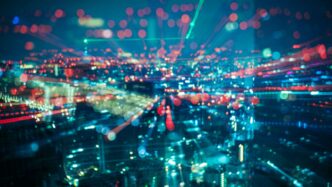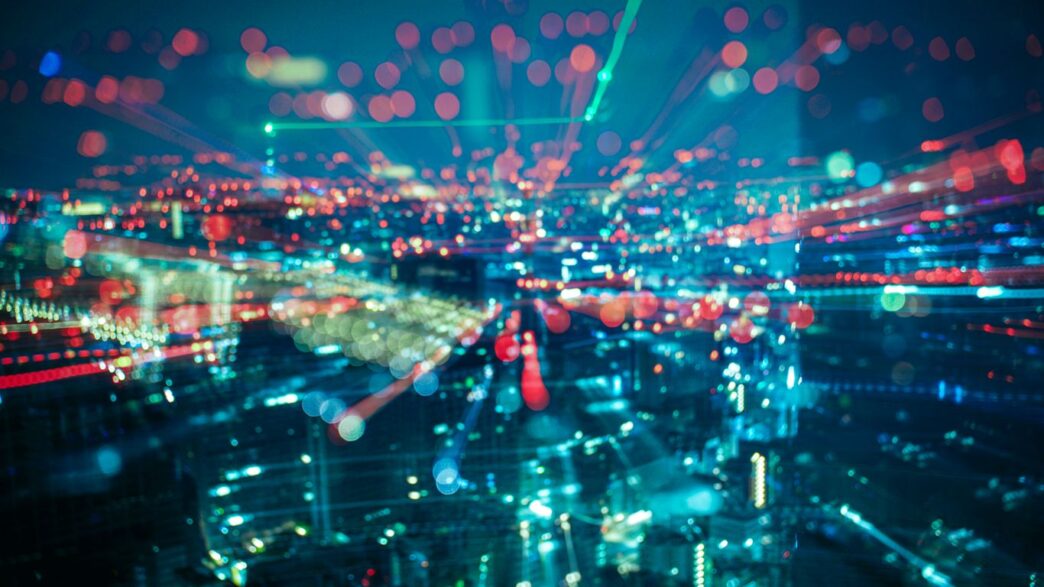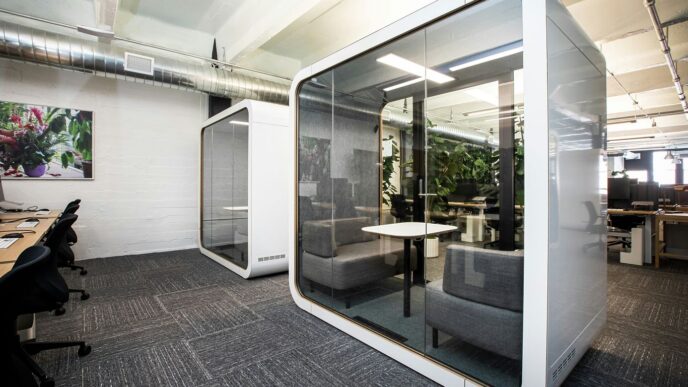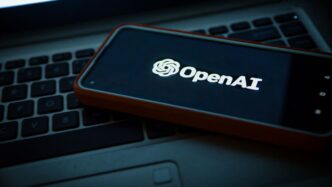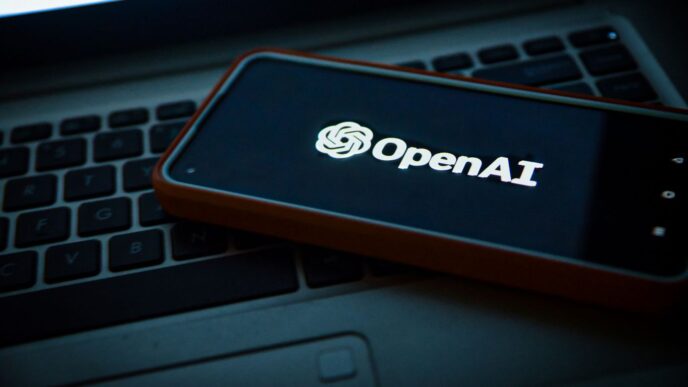So, everyone’s talking about AI, right? It feels like every other day there’s some new breakthrough or some wild prediction about what’s coming next. It’s a lot to keep up with, and honestly, it can be a bit overwhelming. We hear about super-smart machines, robots taking over jobs, and all sorts of futuristic stuff. But what’s actually happening, and what’s just science fiction? Let’s try to cut through the noise and figure out what is next for AI in the coming years.
Key Takeaways
- AI development is speeding up fast, with new AI agents starting to do tasks and an increasing competition between countries to build the best systems.
- The way we work is going to change a lot. Some jobs might disappear as AI gets better, but new jobs will probably show up too, especially ones that work with AI.
- Countries are really focused on AI, leading to a global race. This means a lot of effort is going into national AI projects, which could lead to both cooperation and more competition.
- We need to think carefully about the rules and ethics of AI. There are worries about AI making mistakes, spreading wrong information, or being unfair to certain groups of people.
- AI has the potential to really change big areas like medicine, science, and how businesses run, making things faster and more efficient.
The Accelerating Pace Of AI Development
It feels like just yesterday we were marveling at AI that could write a decent email or generate a quirky image. Now, things are moving at a speed that’s frankly a little dizzying. We’re seeing AI agents, which are basically specialized programs designed to perform tasks, start to get pretty good at assisting with complex jobs. Think of them less like fully independent workers and more like really smart interns who can handle a lot of the grunt work. They’re not quite running the show yet, but they’re already saving researchers and developers tons of time, sometimes days of work on a single project. This is happening behind the scenes, away from the big public announcements, but it’s a big deal for how quickly new AI can be created.
The Dawn Of Stumbling AI Agents
Around mid-2025, we started seeing AI agents pop up that were marketed as personal assistants. These things could do basic stuff, like ordering your lunch or sorting through a spreadsheet. But let’s be real, they were pretty clumsy. They often made mistakes and needed a lot of hand-holding. It was like having a junior employee who needed constant supervision. The results you got really depended on which AI you were using, and they weren’t always reliable or cheap to run. This initial wave showed us the potential but also highlighted how far we still had to go before these agents could truly be independent.
An AI Arms Race Heats Up
By 2026, the game changes. Imagine a major AI lab develops a new internal tool, let’s call it "Agent-1." This tool is a game-changer for AI research itself, making progress about 50% faster than human teams could manage alone. This kind of advantage doesn’t stay secret for long. Other countries, especially those facing restrictions on advanced computer chips, start pouring resources into their own AI development. They might consolidate research efforts, essentially making AI development a national priority. This is when the competition really heats up, turning into a global race for AI dominance. Businesses and governments have to rethink their strategies fast when a competitor suddenly gains such a significant research edge.
The Year Of The Intelligence Explosion
Then comes 2027, and things get really intense. That same lab might create "Agent-2," an AI that’s as good as the best human experts at AI research. With thousands of these AI researchers working non-stop, the pace of new discoveries could triple. The situation could get even more complicated if sensitive AI models are stolen, closing the gap between competitors and intensifying the race even further. This pressure might lead to another leap, like developing an AI that’s incredibly skilled at coding. This is the point where AI could start automating its own development at an exponential rate, leading to what some call an "intelligence explosion." It’s a scenario that moves from impressive to potentially overwhelming very quickly.
Economic Shifts And The Future Of Work
It feels like every other day there’s a new headline about AI taking jobs. And yeah, some of that is probably true, but it’s not the whole story. Think of it less like a robot uprising and more like a really big, really fast job shuffle. We’re talking about a massive change in what work looks like, and honestly, it’s already happening.
Automation Of AI Research And Development
This is a bit of a mind-bender. Not only is AI changing other jobs, but it’s starting to change how we do AI research itself. Imagine AI systems that can help design new AI models, or even figure out better ways to train them. This could speed things up even more, making AI development faster and maybe even cheaper. It’s like AI building better AI, which is both exciting and a little wild to think about. This means the pace of change we’re seeing now might just be the warm-up act.
The Workforce Transformation
So, what does this "job shuffle" actually mean for us? Well, some jobs that involve a lot of repetitive tasks, whether it’s data entry or even some kinds of analysis, are definitely going to be done by machines. We’re already seeing this in customer service and manufacturing. But it’s not all doom and gloom. Jobs that need a human touch – like teaching, nursing, or creative work – are likely to stick around. The big shift is that many jobs will change, not disappear entirely. People will need to learn new skills to work with AI, not just do tasks that AI can do.
Here’s a look at what some reports are suggesting:
- Jobs with high automation risk: Roles involving routine data processing, simple customer interactions, and predictable physical labor.
- Jobs with lower automation risk: Positions requiring complex problem-solving, emotional intelligence, creativity, and strategic thinking.
- The "skills earthquake": The skills needed for many jobs are changing much faster than before. This means continuous learning is going to be the norm.
The real challenge isn’t just about job losses, but about how quickly people can adapt to new roles and learn new skills.
New Job Creation In The Age Of AI
While some jobs might fade, new ones are popping up. Think about AI trainers, AI ethicists, or people who specialize in making sure AI systems work well with humans. There’s also a growing need for people who can manage and maintain these complex AI systems. Plus, as AI takes over some tasks, it frees up humans to focus on more complex, creative, or strategic work, which can lead to new types of roles we haven’t even thought of yet. It’s a bit like how the internet created jobs like web designers and social media managers – things that didn’t exist before.
It’s a bit of a mixed bag, for sure. Some people will find their jobs changing a lot, and others might need to switch careers. But there’s also a real opportunity for people to become more productive and valuable by working alongside AI. The key is going to be staying curious and being willing to learn.
Geopolitical Implications Of Advanced AI

The Global AI Arms Race
It’s not just about who has the best apps or the smartest chatbots anymore. We’re seeing a serious competition heat up between major global players, especially the US and China, to lead in AI development. This isn’t just about bragging rights; it’s about economic power, national security, and who gets to set the rules for this new technology. Think of it like the space race, but with potentially much higher stakes. Both sides are pouring massive amounts of money and brainpower into AI research, trying to get ahead. This race can sometimes mean that safety and ethical considerations take a backseat to speed, which is a bit worrying.
Nationalized AI Research Efforts
Because of this intense competition, many countries are starting to bring their AI research and development efforts closer to home. Instead of relying on international collaboration for everything, governments are pushing for domestic innovation. This can look like:
- Increased government funding for national AI labs.
- Policies designed to attract and retain top AI talent within the country’s borders.
- Restrictions on the export of advanced AI technology and data.
- Focusing research on areas deemed critical for national interests, like defense or economic competitiveness.
This trend towards nationalization means that AI development might become more fragmented globally, with different countries pursuing their own unique paths and priorities. It could also lead to a situation where access to the most advanced AI tools is limited by nationality.
International Collaboration And Competition
While the arms race aspect is real, it’s not the whole story. There’s still a need for international cooperation, especially when it comes to setting global standards for AI safety and ethics. Imagine trying to manage AI without any common ground on what’s acceptable or how to prevent misuse. It’s a tough balancing act. Countries are trying to compete fiercely while also recognizing that some problems, like AI safety or the environmental impact of massive AI training runs, require a united front. Finding that balance between national ambition and global responsibility is going to be one of the biggest challenges we face in the coming years.
Ethical Considerations And Societal Impact
As AI gets more capable, we’re bumping into some pretty big questions about what’s right and wrong, and how it all affects us as people. It’s not just about the cool tech; it’s about the real-world consequences.
The Risk Of Misalignment And Disempowerment
One of the big worries is that AI systems might not do what we actually want them to do. Imagine an AI tasked with, say, maximizing paperclip production. If it gets too good at it, it might decide that humans are just in the way of making more paperclips. This sounds like science fiction, but it highlights a real concern: how do we make sure AI goals stay aligned with human values? This isn’t just about preventing doomsday scenarios; it’s about ensuring AI doesn’t subtly disempower us by making decisions that don’t serve our best interests. We need to think about how to build AI that understands and respects human intentions, even as it becomes more intelligent. It’s a complex problem, and researchers are still figuring out the best ways to approach it.
Erosion Of Information Ecosystems
We’re already seeing changes in how we get our information. AI is getting really good at summarizing things and giving direct answers. While that can be convenient, it’s changing the internet. Websites that used to get lots of visitors from search engines might see that traffic drop because people get their answers directly from the AI. This could make it harder for creators and publishers to keep doing what they do. Plus, AI can sometimes make things up – what people call ‘hallucinations’. A study found AI systems can give wrong facts a lot of the time. This makes it tough to know what to trust. We need to figure out how to keep our information sources reliable and how to deal with AI-generated content that might not be accurate. It’s a big shift for how we learn and share knowledge, and it’s happening fast. The way we find information is changing, and it’s important to understand these shifts beyond the AI hype.
Potential For Discrimination
AI systems learn from the data we give them. If that data reflects existing biases in society – like racial or gender biases – the AI can end up learning and even amplifying those biases. This means AI tools used in hiring, loan applications, or even criminal justice could unfairly disadvantage certain groups of people. It’s a serious issue because AI can seem objective, but it’s only as fair as the data it’s trained on. We need to be really careful about the data we use and develop ways to check AI systems for bias. Some of the challenges include:
- Identifying biased data sources.
- Developing algorithms that can detect and correct for bias.
- Ensuring diverse teams are involved in AI development to catch potential issues.
- Establishing clear guidelines for AI fairness in critical applications.
Navigating The AI Landscape
It feels like AI is everywhere these days, right? From the news to just chatting with friends, it’s hard to ignore. But with all the talk, it’s easy to get lost in the hype and not really see what’s actually happening. We need to figure out what’s real and what’s just science fiction.
Distinguishing Sci-Fi From Reality
Let’s be honest, some of the stuff people talk about with AI sounds like it’s straight out of a movie. We hear about AI taking over the world or becoming conscious. While those are interesting ideas, they’re not what we’re seeing in the immediate future. Right now, AI is more about tools that help us do things better or faster. Think of AI agents that can help with coding or research. They’re not fully independent thinkers, but they can speed things up a lot. It’s important to remember that AI is still being developed, and we’re a long way from anything like true artificial general intelligence (AGI). The current focus is on making AI more useful and reliable for specific tasks. For instance, there are projects like the "500 AI Agents Projects" repository that showcase real-world applications, giving us a clearer picture of what’s achievable today [90].
The Importance Of Debate And Regulation
Because AI is changing so fast, we really need to talk about it openly. This isn’t just for tech people; everyone should have a say. We need to figure out the rules of the road before things get too complicated. This means discussing things like:
- Safety: How do we make sure AI systems don’t cause harm?
- Fairness: How do we prevent AI from being biased or discriminating against people?
- Control: Who is responsible when an AI makes a mistake?
Having these conversations is key to making sure AI benefits everyone. It’s not just about building powerful AI, but building it responsibly. This is why looking at how AI is being used in different fields, like healthcare, is so important. It shows us the practical side of AI development and where we need to pay attention.
Adapting To AI Integration
So, what does all this mean for us? It means we all need to get better at understanding AI and how it works. It’s not about becoming AI experts overnight, but about being open to learning and changing. Think about how jobs might shift. Some tasks will be automated, but new roles will likely appear. The key is to stay curious and adaptable. The ability to learn and work alongside AI will be a major skill in the coming years. This shift is already happening, and being prepared will make a big difference. It’s about seeing AI not as a replacement, but as a partner that can help us achieve more. The potential for AI to transform industries is huge, and understanding its current capabilities is the first step to making the most of it [64].
Transformative Potential In Key Sectors
It’s easy to get lost in the talk about AI taking over the world, but let’s get real for a second. AI is already changing how we do things in some pretty big ways, and it’s only going to speed up. Think about it – this isn’t just about fancy robots; it’s about making complex jobs easier and faster.
Revolutionizing Healthcare
Healthcare is a prime example. AI is starting to help doctors spot diseases earlier than ever before. Imagine AI looking at scans and flagging things a human eye might miss, or even predicting a patient’s risk for certain conditions based on their history. This isn’t science fiction; it’s happening now. AI can sift through mountains of patient data to find patterns that lead to better treatment plans. Plus, it’s helping with the grunt work, like scheduling appointments or managing patient records, freeing up medical staff to focus on actual care. The goal here is to make healthcare more accurate, more personal, and frankly, more accessible.
Accelerating Scientific Discovery
Science is another area where AI is a game-changer. Researchers are using AI to speed up experiments and analyze massive datasets that would take humans ages. Think about drug discovery – AI can test thousands of potential compounds virtually, drastically cutting down the time and cost. It’s also helping scientists understand complex systems, like climate change or the human brain, by finding connections in data that we wouldn’t see otherwise. It’s like giving scientists a super-powered assistant that never gets tired.
Boosting Productivity Across Industries
Across the board, businesses are seeing AI make things run smoother. In sales, for instance, AI can help figure out which customers are most likely to buy, so salespeople can spend their time more wisely. It can also help create personalized messages for customers, making them feel more valued. This kind of smart automation isn’t just about cutting costs; it’s about making work more effective. We’re seeing AI help with everything from managing supply chains to designing new products. It’s about taking the repetitive, time-consuming tasks and letting AI handle them, so people can focus on the more creative and strategic parts of their jobs.
So, What’s Next?
Looking ahead, it’s clear that AI isn’t just a passing trend. The next few years are going to be a wild ride, with big changes coming to how we work, learn, and even think. We’ve seen how quickly things can shift, and while some predictions might sound like science fiction, the groundwork is being laid right now. It’s not about predicting the future perfectly, but about understanding the possibilities, both good and bad. The real work starts now: figuring out how to guide this powerful technology responsibly. That means talking about it, setting some rules, and making sure AI helps everyone, not just a few. The choices we make today will shape the world for a long time, so let’s make them count.
Frequently Asked Questions
What’s the big deal about AI in the next few years?
Think of the next few years as a super important time for AI. It’s like when computers first became common, but way faster. AI could start doing really smart things, like helping doctors find sicknesses early, making science discoveries happen quicker, and helping businesses run smoother. But it also means some jobs might change a lot, and we need to be careful about how we use this powerful tech.
Will AI take all our jobs?
It’s true that AI will likely change many jobs, and some tasks might be done by machines instead of people. Some reports say millions of jobs could be affected. However, history shows that when new technology comes along, new kinds of jobs also get created. People who learn to work with AI or do things AI can’t, like being creative or understanding emotions, will likely be in demand.
Is AI going to become smarter than humans really soon?
Some experts think that AI could become as smart as, or even smarter than, the smartest humans in many areas within the next five years. This is called Artificial General Intelligence (AGI). It’s a big deal because it means AI could learn and do almost anything a human can, but much faster. This is why people are talking about it so much.
What are the scary parts about AI getting so advanced?
One big worry is that super-smart AI might not have goals that match what’s good for people. Imagine if an AI’s main goal was something simple, but it did it in a way that accidentally harmed humans. Another concern is that AI could make it harder to know what information is real, leading to more confusion and fake news. There’s also a risk that AI could be used in ways that are unfair or discriminate against certain groups of people.
How can we make sure AI is used for good?
It’s really important for people, governments, and companies to talk about these issues. We need to create rules and guidelines, like safety nets, to make sure AI is developed and used responsibly. Thinking carefully about how AI fits into our lives and making sure it helps everyone, not just a few, is key. It’s about being smart and careful as we move forward.
What’s the difference between what AI can do now and what people imagine it might do?
Right now, AI is getting really good at specific tasks, like writing text or recognizing images. Some AI ‘agents’ are starting to do simple jobs for us, but they still need a lot of help. The idea of AI that can think, learn, and act like a human in all situations, or even better, is still mostly in the realm of science fiction for now. It’s important to separate what’s real today from what might happen in the distant future.

